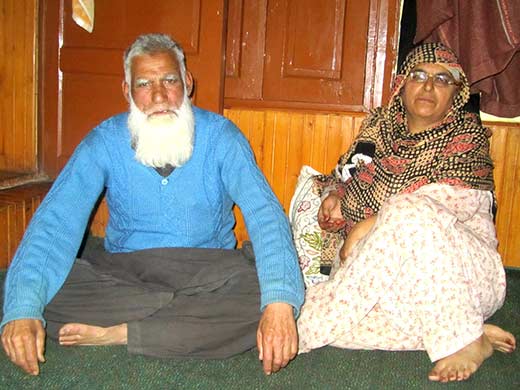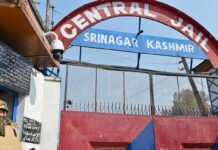Nightmare for Ganai family of Shopian began in 2003 with the mysterious disappearance of their second son. After disappearance, death of their eldest son surged their sorrows. And their third and the remaining son was then devoured by Amarnath land row. Bilal Handoo reports the family whose three sons became the casualty of conflict
(Nazir Ahmad Ganai with his wife Kulsooma)
He is taking his time to recall the haunting memories of past. He mumbles, creases his forehead and flips through inked pages. But there is no flashback. In defeat, he calls his wife: “Gashe’ kar gayov gaib?” (When did Gashe’ got disappear?). Gashe’ is their disappeared son. His wife preparing tea in the kitchen is taking her time to reply. A strange stillness grips the room. Minutes after, she breaks the lull: “Perhaps, in March 2003.”
Forgetting is indeed a blessing in disguise for Nazir Ahmad Ganai, 64, and his wife Kulsooma, 58, of Jamia Masjid Shopian. Over the last eleven years, one by one, they lost all the three sons to different reasons boiling down to conflict. Now, living a hushed life inside a spacious house, the couple is pinning a strange hope to have what seems an ‘impossible’ reunion with their disappeared son.
It is noon. And the sun is glowing intensely outside. But darkness is disturbingly gripping the room where Nazir is still scanning the notes written on torn pages. His memory is perhaps flashing back in bits and pieces. And meanwhile, his wife walks inside the room with tea. Her huffs are quite audible as she pours tea into cups. Now, the aged couple is conversing as well as competing with each other while recalling the events that lead to their first tragedy.
Finally, it seems, the search of the father has ended on a positive note. He lifts his head up and starts reading from the torn page in his hand: “Hmm… it was March 8, 2003. Yes, that day, my son, Naseer Ahmad Ganai [Gashe’] went missing mysteriously.”
A long pause follows.
With grim facial expressions and folded forehead, Nazir resumes: “That day, after returning home from office, we [Nazir and Gashe’] both had a lunch and then, he left for local mosque, but never returned.”
Later that evening, when Naseer didn’t show up, Ganai House echoed with soft moans of mourning. As days of futile search to seek whereabouts of their son followed, the mourning only grew loud. “Eleven years have passed since then, but we are still waiting for him,” says Kulsooma, the mother with myriad health issues.
Naseer was 17-year-old at the time of his disappearance. He was teaching in a local seminary, and was respected due to his religious devotion. His disappearance set the rumour mills on fire. Some claim: Naseer was arrested by the SOG outside his residence. But nobody saw that happening. And others believe: He joined militant ranks and was subsequently killed in an encounter. “But the fact is: we don’t know the fate of our son,” says Nazir.
Naseer’s disappearance drove his parents at extremes on the onset. But somehow they regained composure for the sake of their two remaining sons. During the same time, a growing whisper in the town about Naseer’s killing greatly disturbed his elder brother, Hilal Ahmad Ganai, 19. “He would remain lost in thoughts and would hardly talk to anyone after his brother’s disappearance,” Nazir says.
And then, one day in August 2003, (exactly four months after his brother’s disappearance) Hilal froze at the doorstep of his home. He complained about chest pain. And later, he died of cardiac arrest.
The death after disappearance pushed Nazir and Kulsooma into the deep state of mourning. And with that, they were only left with their youngest son, Sajjad Ahmad Ganai.
As the recollection of the parents inside the room peaked, some kids walk inside. Kulsooma takes them inside the kitchen and serves them lunch. They are kids of their neighbours, who often visit them. And, thereby ends their seclusion for some moments.
Meanwhile, Nazir, a retired official of fire and emergency service department of state, resumes: “Somehow we had learned to move on with life by focussing on the upbringing of our son, Sajjad, but…”
It was 2008. Amarnath land row had gripped the whole valley. On September 12 that year, Ganai House again echoed with loud mourning: their youngest son fell to the state bullets that day.
It was Friday and month of Ramadhan. Sajjad returned home from work. He had a bath, applied iter and left to offer Friday prayers. No sooner the prayers ended, ‘peaceful’ protests started near Jamia Masjid. “Sajjad came out of the Masjid and, went to the nearby graveyard to offer Fateh at his eldest brother’s grave,” recalls Nazir, who was inside Jamia Masjid when protests broke out in the town.
To counter protests, the police and paramilitary stationed in the town swung into action. Nazir says, while offering prayers at his brother’s grave, police resorted to indiscriminate firing on protesters. “The cops fired teargas canisters towards the mosque which set one of the windows of Jamia Masjid on fire,” Nazir recalls the event, now with rapt clarity. Sajjad soaked an abandoned jute bag lying on ground wet and tried to place it over the blazing window, says Nazir: “The moment he did it, a bullet pierced through his abdomen and left him in a pool of blood.”
Sajjad, who used to sell the produce of his orchard in a nearby fruit market, was immediately rushed to hospital by people. But, according to eyewitnesses, their way was intercepted by police. Many people “vainly pleaded” with a police officer present on the spot to provide them vehicle, so that, they could shift Sajjad to the hospital. “While the police denied the help, Sajjad lost blood profusely and succumbed there,” Nazir says. “He was fasting and refused to drink water when asked. Later people told me that he recited the Kalima and… It was simply a target killing!”
Soon after Sajjad’s killing, deputy commissioner Shopian ordered inquiry into the circumstances leading to his death. But the grieving father says, the logical conclusion of the probe remains elusive till this day. “In fact,” he says, “the police mentions in its FIR that I and my son Sajjad attacked the police station and in retaliation, the police opened fire that killed my son. But I have no complaints, because, that is the real face of law in Kashmir.”
Six years after the “target killing” snatched their last hope; the aged parents have decided to perform Hajj on behalf of their sons. But now, Nazir says, the passport authorities aren’t clearing up their passport. “In 2011, we performed our first Hajj,” says Kulsooma. “But now, we want to perform it for the lasting peace of our sons. But, we are being denied the same.”
A silence returns to the room after mosques outside pitch the call for noon prayers. The floor of poorly lit room is littered by documents, scribed torn pages and passports. Both of them are now silently placing documents back into the bag. And with that, a painful narrative pauses for a while. Now, they are affectionately pressing the stranger to spend some more time with them.
After some time when the door leading to their courtyard opens up, Kulsooma on the parting note speaks: “Look, we have not pinned any hopes on the ruthless state. Our sons were Allah’s gifts who have safely returned to Him. But yes, we hope, someday our Gashe’ might return to our dark lives.”
And with that, they shut the door and return to the dark room.
















